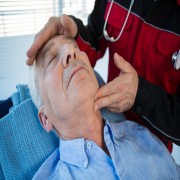New neck scan could predict dementia risk
Five-minute test measures the quality of blood flow to the brain

The heart-wrenching experience of seeing a relative or friend with dementia is now all too common, particularly in countries with ageing populations. And given that this incurable condition can seemingly affect just about anyone as we age, we’re all left with the nagging feeling of “could this happen to me?”
The good news is that scientists believe there’s now a new way to detect our risk of getting the disease, and it only takes five minutes. It’s a neck scan, and it could potentially tell us if we’re likely to develop dementia in the next 10 years.
It does this by a simple analysis of a person’s neck pulse and could become part of routine testing for cognitive decline, according to researchers at the University College London (UCL), who published their work in the American Heart Association’s Scientific Sessions.
More intense pulses in the neck can mean a greater and more irregular blood flow. The researchers found that people with such symptoms were up to 50 percent more likely to suffer reduced cognitive functions because the strength with which blood travelled into their brains caused damage to its network of blood vessels.
According to the study, pulses become more intense when the arteries near the heart become worn down, usually by lifestyle factors such as poor diet and drug use, and can no longer “cushion” the blood flow coming from the heart.
The researchers looked at a group of almost 3,200 patients, aged 58-74, who had ultrasounds taken on their necks in 2002. Their cognitive functions were then monitored over a 15-year period.
“If you can detect [the risk] in people in mid-life, it really gives an impetus to those people to change their lifestyle,” said Dr Scott Chiesa, post-doctoral researcher at University College London, at the annual American Heart Association scientific conference in November 2018.
If the findings are confirmed by larger studies, they could vastly improve our ability to detect dementia in middle age. And, according to Dr Chiesa, the scans are already set up for routine testing as part of a patient’s medical examination for dementia.
While welcome, the study’s findings have been met with cautious optimism by dementia organisations.
“Getting a diagnosis of dementia can be time-consuming and quite frustrating for many people, so it’s promising that earlier indicators of cognitive decline are in development,” said Paul Edwards, Director of Clinical Services at Dementia UK, to CNN. “The elephant in the room is the lack of support for people and their families once they get a diagnosis of dementia.”
While medication can temporarily treat dementia’s symptoms, medical science has yet to find a cure. Previous studies have linked dementia risk to lifestyle factors, such as alcohol consumption and fitness level, but its effects remain largely incurable.
More research will be needed to determine whether the new neck scans should become part of routine testing for dementia. Experts believe that, while the findings are interesting, the full data from the research has yet to be compiled, so it’s still too early to know how useful the new scan will ultimately be. Next steps include MRI scans and tests to see whether the neck scan can improve the “predictive risk scores” for dementia.
Related Articles
The essentials on epilepsy and seizures
Though seizures are the key sign of epilepsy, they can be associated with other conditions as well
Read moreSpinal surgeries without cutting open the patient
Minimally invasive procedures can result in more comfort and less downtime
Read moreExcessive alcohol intake could lead to dementia
Heavy drinkers are at increased risk of developing early-onset dementia, a study suggests
Read moreLatest Articles
Medical Care
Achieving Swift Recovery: Enhanced Recovery (ERAS) Direct Anterior Approach Total Hip Replacement
Consider total hip replacement with Alps Orthopaedic Centre's ERAS Direct Anterior Approach for faster recovery and reduced hospital stays. Learn about Dr. Jerry Chen's expertise in Singapore.
Read moreMedical Care
Enhanced Recovery (ERAS) Total Knee Replacement
Discover how Alps Orthopaedic Centre's Enhanced Recovery After Surgery (ERAS) approach transforms total knee replacement into a day surgery, offering faster recovery, less pain, and reduced hospital bills. Learn about Dr. Jerry Chen's expertise and schedule your appointment in Singapore.
Read moreMedical Care
Clinical Exercise Physiologist (CEP): The Emerging of Exercise is Medicine
How Exercising can be a Medicine
Read more